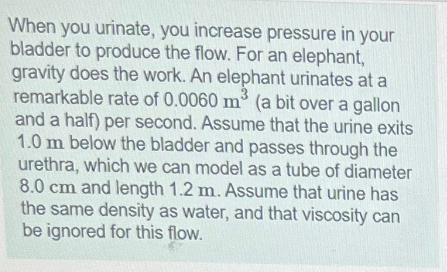Answered step by step
Verified Expert Solution
Question
1 Approved Answer
When you urinate, you increase pressure in your bladder to produce the flow. For an elephant, gravity does the work. An elephant urinates at


When you urinate, you increase pressure in your bladder to produce the flow. For an elephant, gravity does the work. An elephant urinates at a remarkable rate of 0.0060 m (a bit over a gallon and a half) per second. Assume that the urine exits 1.0 m below the bladder and passes through the urethra, which we can model as a tube of diameter 8.0 cm and length 1.2 m. Assume that urine has the same density as water, and that viscosity can be ignored for this flow. If we assume that the liquid is at rest in the bladder (a reasonable assumption) and that the pressure where the urine exits is equal to atmospheric pressure, what does Bernoulli's equation give for the gauge pressure in the bladder?
Step by Step Solution
There are 3 Steps involved in it
Step: 1

Get Instant Access to Expert-Tailored Solutions
See step-by-step solutions with expert insights and AI powered tools for academic success
Step: 2

Step: 3

Ace Your Homework with AI
Get the answers you need in no time with our AI-driven, step-by-step assistance
Get Started


